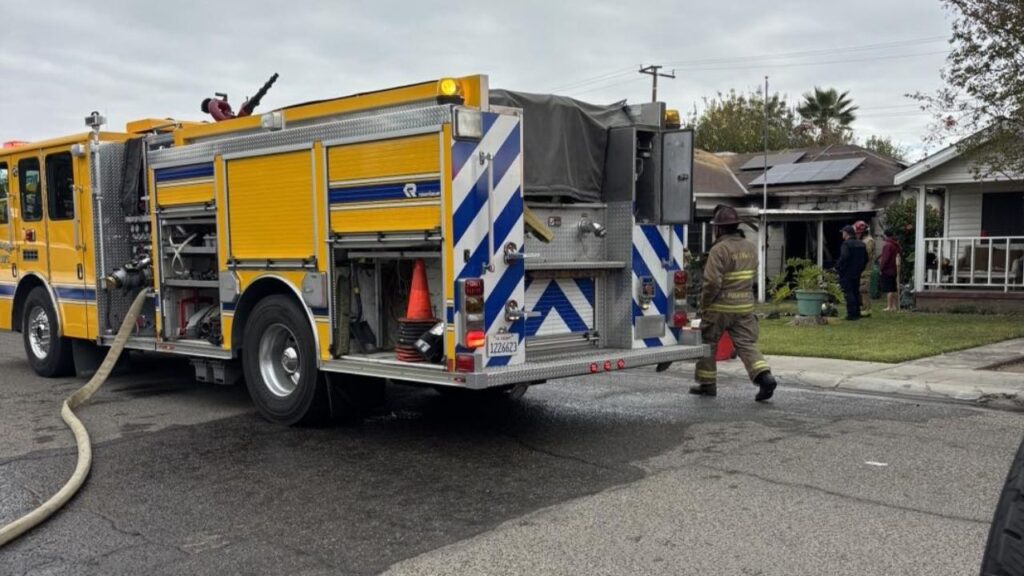Dolores Huerta and Nayamin Martinez opine that California's climate progress faces a new threat as the fossil fuel industry pushes for carbon capture projects. (CalMatters/CatchLight Local/Larry Valenzuela)

- Carbon capture technology has captured only seconds' worth of yearly greenhouse gas emissions despite decades of investment.
- The technology poses risks to communities already burdened by fossil fuel pollution, including dangerous gas leaks.
- California's largest oil producer could receive $15 billion in tax credits for carbon capture projects in Kern County.
Share
|
Getting your Trinity Audio player ready...
|
Perhaps no other state in the nation has done more to fight climate change than California.

Dolores Huerta

Nayamin Martinez
Opinion
We stood up to the powerful auto industry and passed the first U.S. ban on new gasoline-powered car sales. The state is suing the world’s largest oil producers for decades of climate deception. Soon we’ll be stopping all new fracking as part of an historic plan to end oil extraction across the Golden State.
Even businesses, municipalities and advocates are uniting around an ambitious goal of achieving 100% clean power by 2045 by investing billions in renewable energy and eliminating the root cause of climate change — burning fossil fuels.
Now we appear poised to undermine this progress by opening California’s doors to the fossil fuel industry’s latest greenwashing scheme: carbon capture and storage. Let’s hope our politicians and environmental regulators, including the Environmental Protection Agency and the Department of Energy, reconsider.
Fossil Fuel Industry’s Push for Carbon Capture
The fossil fuel industry is spending millions to persuade the public that carbon capture is a viable solution to the climate crisis, but in reality, it’s a failed technology. And a growing number of climate scientists and energy experts, including the International Energy Agency, agree.
Generally carbon capture and storage refers to technology that captures carbon dioxide from industrial or power plant emissions and puts it underground, where it is not expected to contribute to global warming.
But the problems with carbon capture and storage are vast. For starters, according to Jonathan Foley, former head of the California Academy of the Sciences, even after decades of investment in research and development and millions in subsidies, carbon capture technology has only captured a few seconds’ worth of our yearly greenhouse gas emissions.
That’s hardly a dent.
Furthermore, carbon capture extends the operations of the polluting infrastructure and increases our reliance on fossil fuels. Every dollar spent on carbon capture and storage takes precious resources away from real climate solutions, thereby delaying the transition to a clean energy future.
Related Story: Costa Bill Opens Grants for Heavy Manufacturers to Start Using Hydrogen
Risks to California Communities
Most troubling, though, are the risks that carbon capture and storage infrastructure pose to California communities already overburdened by fossil fuel pollution.
GV Wire encourages vigorous debate from people and organizations on local, state, and national issues. Submit your op-ed to bmcewen@gvwire.com for consideration.
This technology does nothing to address the lung-damaging pollutants caused by extracting oil and gas, and it dramatically increases the likelihood of a dangerous — or even fatal — gas leak. There have been at least 25 carbon dioxide pipeline leaks in the U.S. from 2002 to 2021, including one that caused 200 people to be evacuated and 45 to be hospitalized in Satartia, Mississippi for years ago.
So what’s the industry’s motive for promoting a flawed, dangerous and essentially defunct technology? Easy: to delay the phaseout of fossil fuels while seizing billions in state and federal dollars. Adding carbon capture to a project, and snapping up the federal incentives that come with it, would allow oil and gas producers to continue generating revenue by keeping polluting infrastructure going for decades.
Related Story: California Has Enough Debt. It Doesn’t Need $10 Billion More for a ...
California’s Largest Oil Producer’s Carbon Capture Plans
For instance, California’s largest oil producer is California Resources Corp., in Long Beach, which merged with Aera Energy in Bakersfield, following California Resource’s $6 billion bankruptcy. The merged company has proposed converting two old, unproductive oil fields in Kern County into California’s first carbon capture and storage sites.
The state could have required $1 billion in orphaned wells bonds, but instead it let California Resources off the hook. Now the conversion of both sites makes the company eligible for more than $15 billion in tax credits for just one of the carbon capture projects, according to MIT research.
Both projects’ impact on air quality would be significant, according to their draft environmental impact reports. Despite this, Kern County’s Planning Commission recently voted to recommend the Board of Supervisors approve California Resources’ carbon capture project, and commissioners may vote on the pending Aera project soon. Final approval of the projects would be terrible news for all Californians, but especially for the families who live in nearby Buttonwillow, Taft, Tupman, Bakersfield and Lost Hills, who have borne the brunt of the fossil fuel industry’s pollution for decades.
Related Story: Hundreds of Homes Impacted by Court Ruling on Fresno Enviro Docs
Our regulators and politicians should honor California’s commitment to fight climate change and get off fossil fuels, and they should block any industry attempts to bring carbon capture and storage to our door.
Approving California Resources’ permits would open the floodgates to similar projects across Greater Los Angeles, the Bay Area, and Sutter County, and it would subject even more communities to yet another fossil fuel scheme.
California has banned some of the fossil fuel industry’s most harmful practices, and we’re seizing the promise of renewable energy at every turn. Now we have the opportunity to prevent oil and gas corporations from squandering billions in public funds, to protect Kern County families and to lead the nation and world in denouncing the carbon capture farce.
Let’s recognize this opportunity and stop any carbon capture permits before it’s too late.
About the Authors
Dolores Huerta is president of the Dolores Huerta Foundation and co-founded the United Farm Workers union with César Chávez. She is a longtime civil rights activist and community organizer. Nayamin Martinez is the executive director of the Central California Environmental Justice Network.
About CalMatters
CalMatters is the only nonprofit newsroom devoted solely to covering statewide issues that affect all Californians.
RELATED TOPICS:
Categories

Kazakhstan to Join Abraham Accords, Trump Says

Who Will Replace Pelosi in Congress?


















